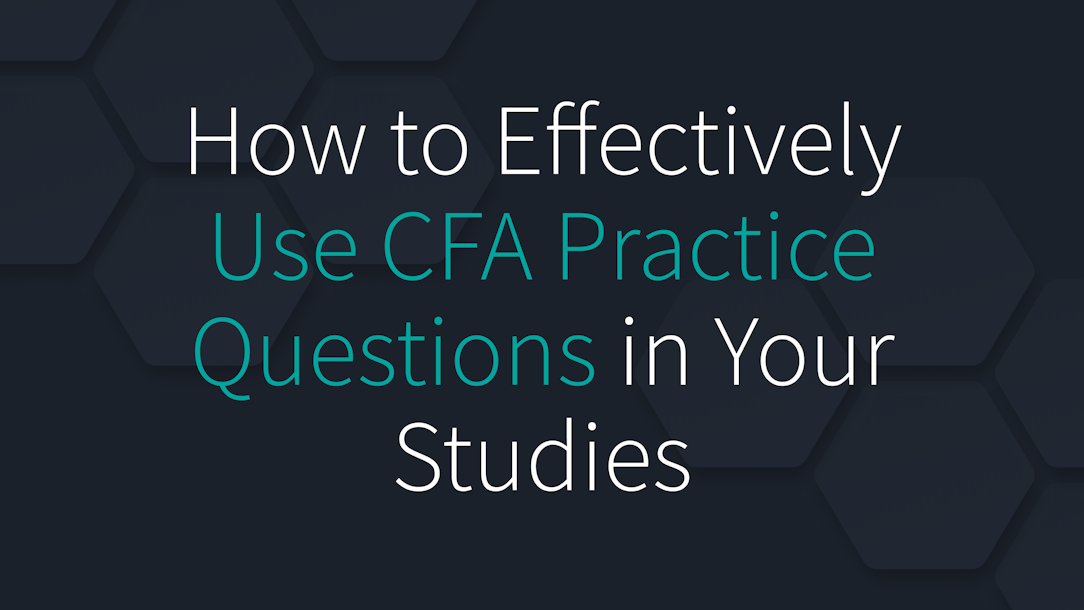
How to Effectively Use CFA Practice Questions in Your Studies
CFA practice questions are the cornerstone of a solid exam strategy—but only when used correctly. It’s not about how many questions you solve, but how well you learn from each one.
The CFA exam is a formidable challenge that demands strategic preparation. While reading through the curriculum is essential, practice questions are the secret weapon to mastering concepts, improving recall, and building exam-day confidence. However, simply answering questions isn’t enough—you need a well-defined approach to get the most out of your study sessions.
Below, we’ll break down the best practices for utilizing CFA practice questions effectively, ensuring that your efforts translate into exam success.
1. The Power of CFA Practice Questions
CFA practice questions do more than test your memory—they sharpen your ability to apply concepts, recognize patterns, and think critically under time constraints. The CFA exam is not just about knowledge; it’s about application. Engaging with practice questions allows you to bridge the gap between theory and real-world financial scenarios.
To maximize effectiveness, don’t wait until the last few weeks to dive into practice questions. Instead, integrate them into your study plan from the start, using them as a tool for active learning rather than just a last-minute assessment.
2. Choosing the Right CFA Practice Questions
Not all practice questions are created equal. To ensure your preparation aligns with the CFA exam’s rigor, focus on:
- CFA Institute’s Official Practice Questions – These best reflect the exam’s wording, structure, and complexity.
- High-Quality Third-Party Question Banks – Look for providers that create original, exam-level questions rather than recycled or overly simplistic ones.
- Full-Length Mock Exams – Simulating the actual test environment helps build endurance and time management skills.
Avoid low-quality question banks that do not accurately reflect CFA exam difficulty, as they can create false confidence or, conversely, unnecessary frustration.
3. Active Learning: How to Approach CFA Practice Questions
Mindlessly answering questions and checking answers is ineffective. Instead, adopt an active learning strategy:
- Read, Solve, and Justify – Before looking at answer choices, attempt to reason through the problem. This strengthens analytical thinking.
- Track Your Errors – Keep a mistake log and categorize errors to identify recurring weak areas.
- Understand the Why – Don’t just memorize answers; understand why a particular option is correct (or incorrect).
This approach ensures that you internalize the logic behind CFA exam questions, rather than relying on rote memorization.
4. Balancing Practice Questions with Concept Review
While practice questions are crucial, they shouldn’t replace concept review. Aim for a structured approach:
- Early Stage: Focus 70% on learning concepts, and 30% on practice questions.
- Mid Stage: Shift to 50% concepts and 50% questions.
- Final Stage: Emphasize practice, with 80% of your time dedicated to mock exams and question drills.
This progressive balance helps reinforce concepts while gradually transitioning into exam-style application.
5. Reviewing Mistakes and Adjusting Study Focus
Your mistakes are your best teachers. Every incorrect answer highlights a knowledge gap or a misinterpretation. Instead of skimming past errors, use them to refine your understanding:
- Revisit Weak Areas – If you repeatedly struggle with a topic, go back to the core material.
- Identify Patterns – Are your errors calculation-based, concept-based, or misinterpretations? Tailor your study plan accordingly.
- Simulate Exam Pressure – Time yourself to build exam-day resilience.
By treating mistakes as learning opportunities, you transform them into stepping stones toward mastery.
6. The Final Push: Full-Length Mocks and Exam Readiness
As exam day nears, shift your focus to full-length mock exams. These tests serve multiple purposes:
- Assessing Readiness – Identify your strengths and weaknesses in a simulated test environment.
- Building Stamina – The CFA exam is mentally demanding; practicing under realistic conditions helps with endurance.
- Fine-Tuning Exam Strategy – Learn how to pace yourself and navigate tricky questions efficiently.
Don’t just take mock exams—analyze them thoroughly. Spend as much time reviewing the results as you did completing the test.
Conclusion
CFA practice questions are the cornerstone of a solid exam strategy—but only when used correctly. It’s not about how many questions you solve, but how well you learn from each one. Effective utilization means integrating them early, analyzing mistakes, balancing conceptual review, and leveraging full-length mock exams to refine your approach.
At Salt Solutions, we understand that mastering CFA practice questions requires more than just access to question banks—it demands high-quality materials, structured learning, and expert guidance. Whether you're preparing for the CFA Level 1 Exam, navigating the complexities of the CFA Level 2 Exam, or tackling the final stage of the CFA Level 3 Exam, we provide industry-leading study materials, top-tier prep resources, and Salt Solutions products to ensure your success.
Your CFA journey is demanding, but with the right tools and strategy, you can conquer it. Let Salt Solutions guide you every step of the way.